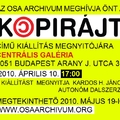Londonban egy forum volt e alkalomból a British Council résztvetelével. Több információkövetkezik:
Copyright 1710-2010: ‘For the Encouragement of Learning’
Recreating Copyright for the 21st Century
Anniversary Forum, London, Friday 9 April 2010
Copyright is the currency of the creative economy; but copyright laws are complicated and as much flouted as upheld. If we were starting afresh, what sort of copyright would we want to have?
The world’s first copyright law was the Statute of Queen Anne described by the English Parliament as ‘An Act for the Encouragement of Learning’. The Statute marked the beginning of modern copyright law. Halsbury’s Laws of England, edited by Lord Hailsham, said, ‘In changing the conceptual nature of copyright, it became the most important single event in copyright history’. Barbara Ringer, US Registrar of Copyrights, said, ‘It is the mother of us all, and a very possessive mother at that.’
The Queen Anne Statute came into force on 10 April 1710. It established the principles of copyright law:
The purpose of the ‘encouragement of learning’ (repeated verbatim in the 1790 USA Copyright Act).
The right of authors to own their output.
The right of the public to access what is written.
The principle that both these rights are conditional.
The principle that both rights should be mutually balanced.
The principle that the terms of trade between authors and printers/publishers should be fair.
These principles have always been controversial. Daniel Defoe, whose novel ‘Robinson Crusoe’ was published in 1719, said ‘A book is the author’s property, tis the brat of his brain. Writing is become a very considerable branch of English commerce.’ But Lord Macaulay, the politician and historian, said ‘copyright is a tax on readers for the purposes of giving a bounty to authors’.
The 300th anniversary provides a unique opportunity to review copyright’s purposes and principles around the world. If today we were starting from scratch – but with the same aim of encouraging learning – what kind of copyright would we want?
To answer this question, we are organising an Anniversary Forum in London on 9 April 2010.
We are asking a range of people involved in making, selling and using copyright to give us their views.
Our starting point is the question ‘what is the purpose of copyright?’ And,
if that is agreed, how can we achieve it? Is the list of ‘qualifying works’ the right one? Should copyright arise automatically, or should it be registered? Is ‘copyright’ the appropriate name? How do we balance access and ownership? What are the optimal lengths of copyright terms? What are the roles of competition policy and of the protection of personal data and privacy in copyright law?
What are reasonable limits for allowing or encouraging people to copy digital media? Do Open Source principles have general application to all copyright? What do we mean by ‘fair’ in the phrases ‘fair dealing’ and ‘fair use’, and how do we uphold this fairness in practice? How do we balance new consumer behaviour towards copying with right-holders' commitment to exclusive rights? How do we ensure the law is sufficiently flexible to accommodate new technologies and new licence terms? What is the role of moral rights whereby people have the right to be named as the author, and for their work not to be adulterated? How do we define unlawful copying and how do we promote a fair regime of sanctions and penalties?
Our answers must recognise that the opportunities for creating and copying have expanded dramatically. Copyright has always adjusted to include new technologies, but digital technology is not only a more profound technical change than any before but has sparked profound changes in social and business relationships, changing the relative roles of the individual, industry and the public. We all enjoy greater freedom than ever before to create and copy media; but businesses need new business models to secure upfront investment and generate revenues.
On 9 April 2010 at NESTA, London, we will mark the anniversary in the best way possible: by asking the same question people asked in 300 years ago and seeing what answers we come up with.
For further information please contact:
John Howkins, Chairman, Copyright 1710-2010
+44 20 7434 1400
john@johnhowkins.com
or
Aine O'Keeffe
British Council London
copyright2010@britishcouncil.org


